THE DESTRUCTION OF BEAUTY.
[To THE EDITOR or THE "SPECTATOR"] SrE,—I have probably more opportunity than most of your readers for observing how far natural beauty is possible in a colliery neighbourhood. Within a mile of my house is a small pit raising five hundred tons a day. This pit is almost buried in a wood, only the trees in immediate proximity showing any signs of being prejudicially affected. I confess, however, that in all that long belt of coal-field, which extends from Leeds to Nottingham, the collieries are only too often horrible in their naked ugliness, and the gaunt rows of cottages round them are almost more so. Further east, in the new coal country, which is making Doncaster a great colliery centre, a different condition of things obtains. The pits are deeper, larger, and fewer, and consequently there is room for rural beauty in plenty between them. The colliery villages are of a superior type, sometimes, as at Brodswortb, models of neat- ness and architectural charm. Mr. Thackeray Turner is wrong in thinking that fuel is so cheap at collieries that no attempt at economy is ever made. Such a statement may have been true once, but the consumption of a large per- centage of the output is now considered poor practice, and economy of fuel is effected in every possible way. A system of " forced-draught " for colliery boilers enables a very in- significant chimney to be used and there is practically no smoke, owing to the preheating of the air. Electric power from gas engines is also applicable to collieries, the gas being supplied either from retort coke-ovens or from producers. Electricity has not, however, so far found much favour in England for winding—i.e., actually raising the coaL A certain amount of ugliness is inseparable from coal-getting, and I think it should be remembered that England owes her premier
place among the nations to her coal. Let us be devoutly thankful that there is coal in Kent, and that the South of England may soon contribute to the commercial prosperity of the country without losing, to any great extent, its natural beauty.—I am, Sir, &c., W. NEWTON DREW, Ecclesfield, near Sheffield. Assoc. Roy. Sch. of Mines.
[Quite so ; but let us not merely talk about preserving the beauties of the southern coal area. Let us take action before it is too late. We want to " rouse in many an ancient Hall the gallant squires of Kent "—not to obstruct the industrial development of the county, but to make sure that no waste of beauty shall take place where such waste is unnecessary. Let Kent show England that " Garden Collieries" are not merely a dream, but can be made a reality.—En. Spectator.]




































 Previous page
Previous page